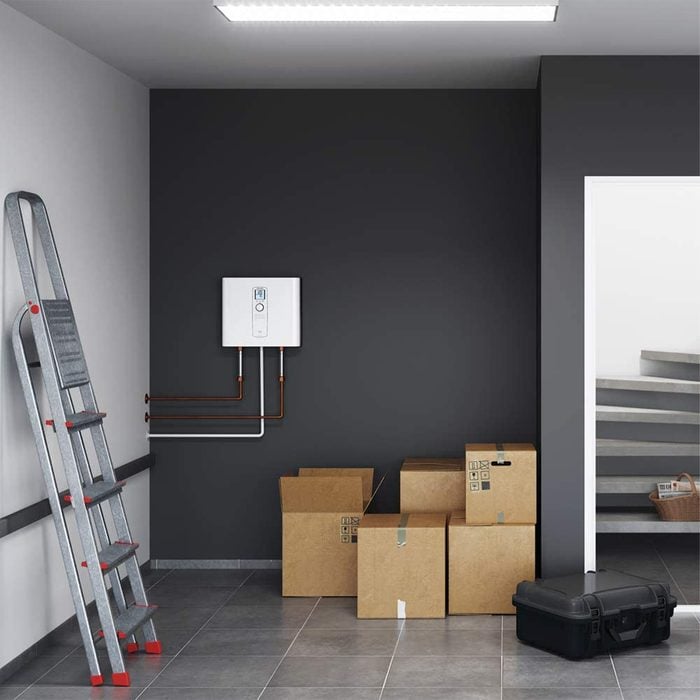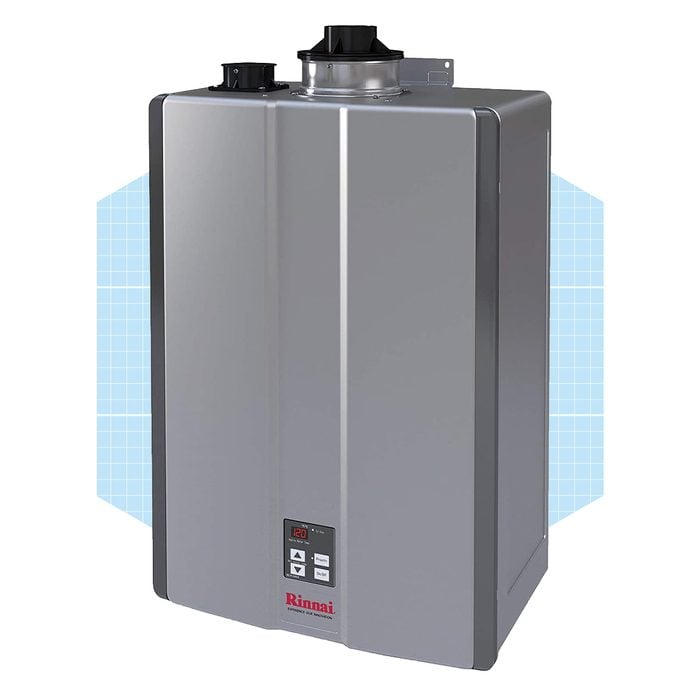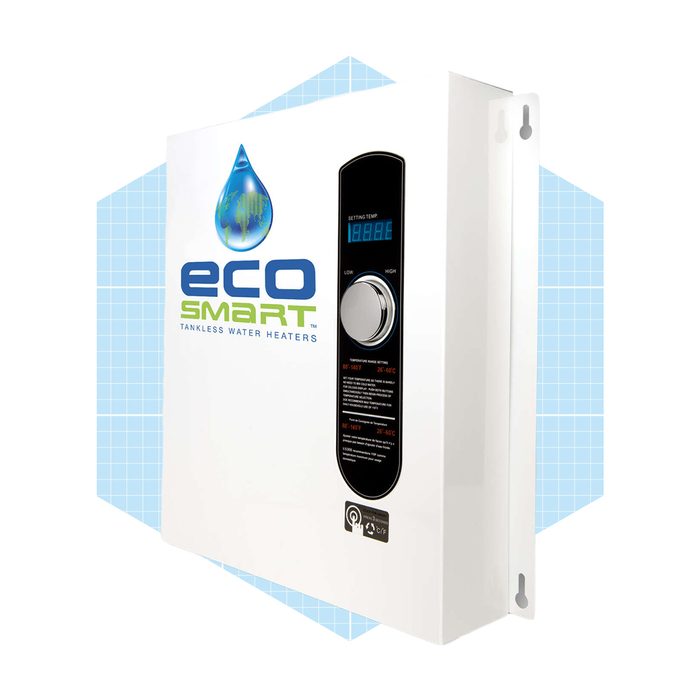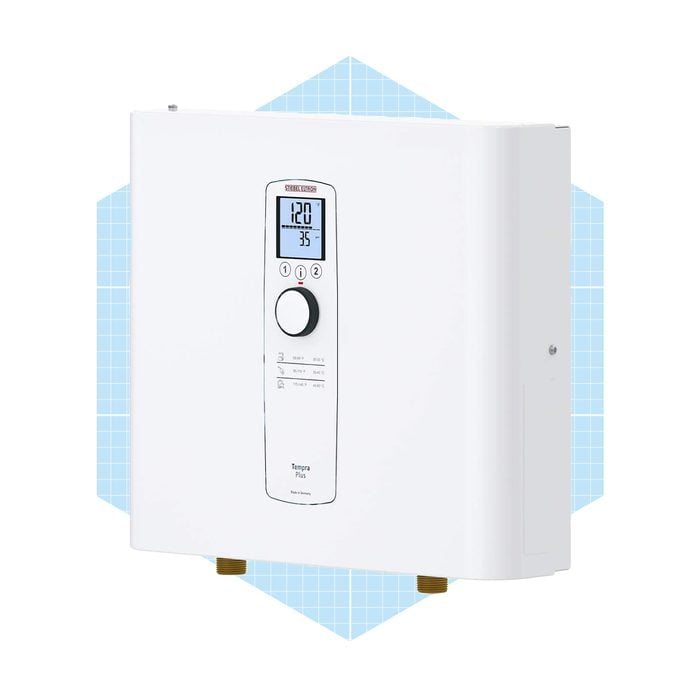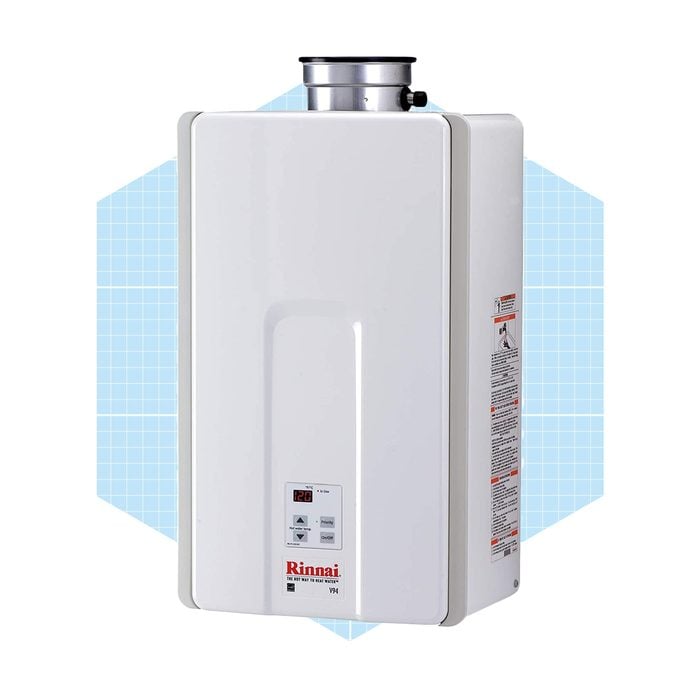5
/
5
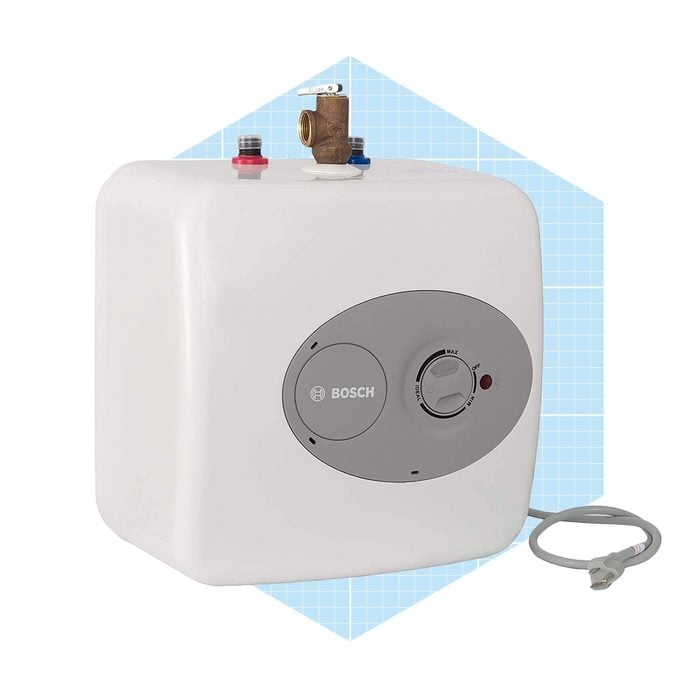 via merchant
via merchant
If you have a spot in your home that may require some extra “oomph” when it comes to hot water, the Bosch Electric Mini-Tank Water Heater is a tremendous point-of-use option and an Amazon top seller. This mini tankless water heater doesn’t require any professional installation and fits under your sink to provide more hot water where you need it. The unit offers up to four gallons of hot water at that fixture, so it cuts down on lengthy wait times before doing the dishes or taking a shower.
Pros
- Can be added wherever extra hot water is needed
- Lightweight, compact design
- Affordable
- Easy to install
- Premium glass-lined material for a long service life
Cons
- May lose storage space if used under the sink
Types of Tankless Water Heaters
- Gas tankless water heaters are safer than conventional water heaters and often last longer. However, they are prone to scale buildup and may need extra cleaning.
- Electric tankless water heaters are highly efficient but require a lot of electricity. For example, a conventional electric water heater uses about 5,000 watts of electricity, while the tankless version can use more than 25,000 watts.
What to Consider When Buying a Tankless Water Heater
First, do you want to go with electric or gas? Both options offer benefits, but switching from a gas-storage water heater to an electric tankless model may require some electrical and plumbing updates (and vice versa). Some tankless models have smart capabilities, which you may find handy.
Next, think about how much hot water you’ll need at a time. If you’re going to run two showers, the dishwasher and the laundry machine at once, you may need a model that produces a higher volume of gallons per minute.
“In addition to the sizing calculations that need to be considered for proper functionality, the venting requirements for a tankless water heater are also important,” says Cannizzaro. You’ll need to check the venting setbacks from doors, openable windows, utilities, etc., she says.
Cannizzaro has another vital tip: “The most important item with a tankless water heater is to make sure it’s properly installed from the start. It may seem like a silly statement, but people would be shocked at the number of tankless installations we are brought in to help fix only to determine that the unit was never properly installed,” she says.
Finally, consider the purchase price. While tankless water heaters will save you money in the long run on your energy bills, some may be pricey in upfront costs.
Why You Should Trust Us
I lived through a major home renovation in 2019 so I know the ups and downs of home improvement projects. I’m a veteran journalist of both print and television with experience covering everything from home decor and design to lawn and garden products. In addition to Family Handyman, I’ve contributed to various publications including Bob Vila, Taste of Home and Minnesota Parent; and have won several awards for writing.
We also consulted Jessie Cannizzaro for this article. Cannizzaro is a master plumber who owns Milestone Plumbing, a residential and small commercial plumbing business. She started the company in 2011 in her Wauwatosa basement and garage. She grew up joining her dad on the job at his plumbing company, learning to solder at the age of seven. Her passion for the business continued to develop over the years through apprenticeship and after earning her bachelor’s and MBA at UW-Milwaukee. Besides supervising 16 employees, she advocates for multiple organizations that encourage high school students to enter the trades.
How We Found the Best Tankless Water Heaters
As shopping experts, our only job is to help you find a winning product. We start with the research and reporting basics—what products are made of, what they look like and how much they cost—to ensure that we’re only recommending the buys that are worth your time and money. Then, we research the features that speak to the product’s quality, taking advice from industry insiders and subject-matter experts on what makes a product a smart value (or worthy of a splurge). Finally, we do the work of combing through user reviews to see how real people interact with the product, and if it stands up to the test.
FAQ
How do tankless water heaters work?
Tankless water heaters have no storage tank. Instead, they heat water directly only when you need it. Turn on hot water, and a supply of cold water travels into the tankless unit and heats up via an electric element or gas burner. This gives you a constant supply of hot water.
What is the downside of a tankless water heater?
“Multiple units often are necessary to get the correct volume and pressure for the fixtures within a home to operate correctly,” warns Cannizzaro. “Multiple tankless units also increase the costs for installation. They may also require that the water piping and gas piping be increased to provide additional capacity as well,” she adds.
“One common misconception that we hear is that tankless water heaters provide instantaneous hot water, which is not true,” reveals Cannizzaro. “The distance the tankless water heater is located from the fixtures will determine how long it takes for hot water to arrive—if there is a recirculation pump installed for the tankless that will allow the hot water to arrive quicker.”
Are tankless water heaters hard to maintain?
“It’s important for people to know that there is annual maintenance that is necessary to keep the unit operating at optimal levels. Technically, all water heater manufacturers recommend some level of annual maintenance, but tankless models are more susceptible to having issues if that maintenance is not performed regularly,” says Cannizzaro. This means cleaning or replacing the water filter, cleaning the air filter (for gas units) and descaling and flushing the system. You can do this yourself or hire a plumber.
“Another challenge with some tankless water heaters can also be the availability of parts. With many traditional tank-style water heaters, parts are readily available, which makes the time a client is without hot water shorter,” notes Cannizzaro. If you go tankless and need a repair, parts may be harder to find, which may leave people without hot water for an extended period.
Is there a federal tax credit for tankless water heaters?
If you install a tankless water heater, you may qualify for a federal tax credit under the Energy Efficient Home Improvement Credit. If you made qualified energy-efficient improvements to your home after January 1, 2023, you may qualify for a tax credit up to $3,200. For instance, Energy Star-certified water heaters that use natural gas could get you up to $600 back. You can claim the credit for improvements made through 2032. The manufacturer should also have information on what models qualify for various credits.
How to Choose the Perfect Water Heater
From tankless to traditional models, our expert tips will help you find the right water heater for your home and budget.




















